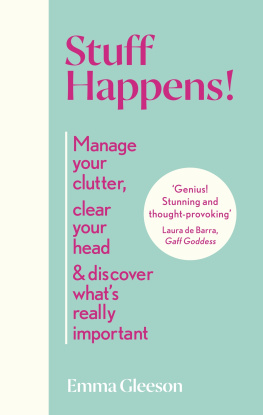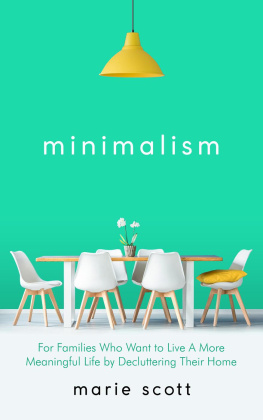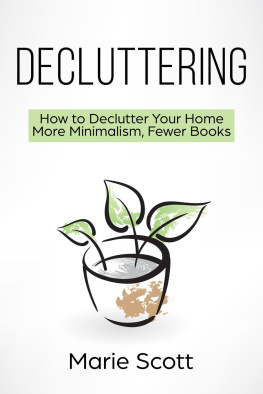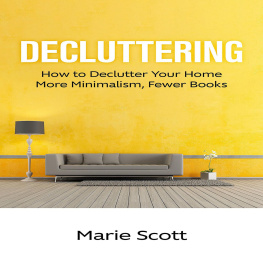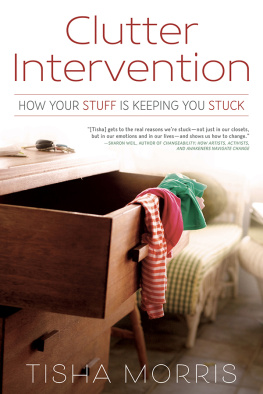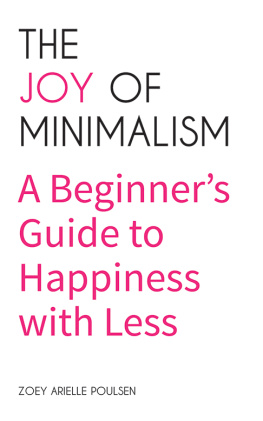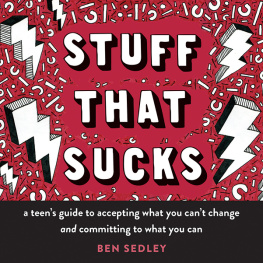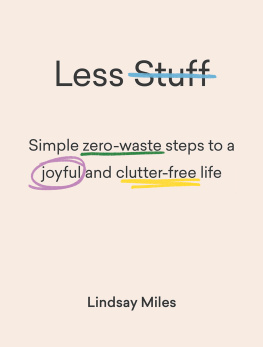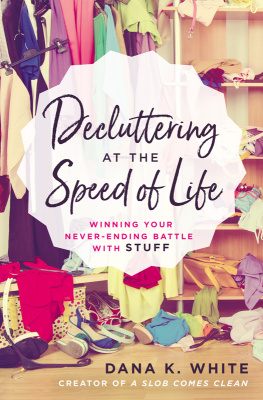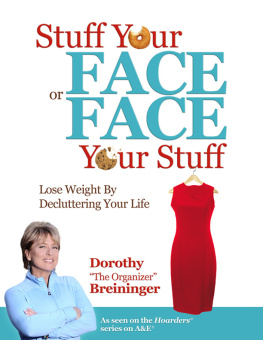Emma Gleeson
STUFF HAPPENS!
Manage your clutter, clear your head & discover whats really important

PENGUIN BOOKS
UK | USA | Canada | Ireland | Australia
New Zealand | India | South Africa
Penguin Books is part of the Penguin Random House group of companies whose addresses can be found at global.penguinrandomhouse.com.

First published by Sandycove in 2021
Copyright Emma Gleeson, 2021
The moral right of the author has been asserted
Cover design by One Darnley Road
ISBN: 978-0-241-98821-3
This ebook is copyright material and must not be copied, reproduced, transferred, distributed, leased, licensed or publicly performed or used in any way except as specifically permitted in writing by the publishers, as allowed under the terms and conditions under which it was purchased or as strictly permitted by applicable copyright law. Any unauthorized distribution or use of this text may be a direct infringement of the authors and publishers rights and those responsible may be liable in law accordingly.
For Michael and Joan
Introduction
This book is about getting to grips with your stuff in the midst of a busy life. It is not just about tidying your house. Many versions of that book already exist. It is a look under the bonnet of our shopping habits, which are the main root causes of household clutter. Clutter is the symptom, but the way we value our possessions is the problem, from the moment we buy them to when its time to let them go.
While some of us are naturally better than others at avoiding its clutches, clutter is an increasingly troublesome by-product of the way those of us who live in wealthy countries operate. Clutter affects all of us in different ways. Some people are experts at hiding it from sight and others manage to clear it out quickly (often only to make room for more). Some people dont give a damn about the clutter in their homes and live their lives in their own brand of perfectly organized chaos. Then there is another type of person, one who feels suffocated by a house full of stuff but can never find the bloody hammer, or Sellotape, or a particular dress when they need it. No matter what kind of person you are, there will be something in these pages for you.
Its up to you how you use this book. You might prefer to skip the sections that look at the psychology of shopping and only read the how-to-declutter-your-home chapters. I would gently advise against this. It would be like someone going to psychotherapy for the first time and saying to the therapist, I know I have issues, but no childhood stuff, please.
Heres the truth: Decluttering our homes without looking at why we have so much stuff in the first place is like going on a crash diet it wont stick and youll be back to square one within months.
We need to properly understand why we feel so compelled to accumulate possessions. We need to recognize that this acquisitive way of life does not make us happy. We need to care about where our possessions come from, how they are made, and by whom. From there, real change can begin to take place.
For many years now, I have helped people declutter their homes and organize their possessions. I am admittedly one of those weirdos who gets a kick out of decluttering. Some people relax by ironing; a high-powered executive I know unwinds by polishing silver it takes all sorts. My particular quirk means that I have come to care deeply about our relationships with the things that aid and decorate our lives. I also have an MA in Fashion History and have been fascinated by material culture and the stories behind everyday objects for the past decade.
My aim with this book is not to preach. Decluttering and organizing has become another means of making people (well, lets be honest women) feel like they are not doing enough. All too often it is just another Keeping up with the Joneses competition. I want to strip all that away and offer a more measured view of the benefits of decluttering our lives, such as the feeling of lightness when the burden of stuff is lifted, a renewed sense of gratitude for all that you have, and a shift towards more mindful shopping and disposal habits.
Heres my decluttering philosophy in a nutshell:
- Let your home only contain items that you use and that you love.
- Store your possessions in a way that makes sense for you.
- Pass items on responsibly when you are finished with them.
- Pay more attention to how and why new items enter your home in the first place.
It has taken me many years of discovery to reach this perspective. I used to be someone who collected scraps of fabric and paper, unwearable charity-shop finds, and anything being given away, even if I didnt need it. I used to be someone who bought myself things when I was sad. But I began to feel, as many of us do at present, that all this stuff wasnt doing me any good. Gradually and gently, I started to shed my possessions, with the intention of keeping only the stuff I loved or had a use for, and I built a business to help other people begin to do the same. I am by no means a minimalist. My philosophy is what I like to call mindful materialism I love things, but Im mindful about how they enter my life, how they are cared for, and how they leave when I no longer need them.
This process takes time, and along the way it can sometimes feel as if youre taking two steps forward and one step back, like any life adjustment. My own path to get to where I am today has not been straightforward and I have often wished for the power to put some order on the chaos. Across the last ten or so years I have been a costume designer, an events producer, a poet, a book reviewer, a psychotherapy student, a sustainable-fashion lecturer and a waitress. Ive also suffered from several debilitating bouts of poor mental health which ground my life to a complete halt. Ive shuttled back and forth between house shares and my family home, dragging my constantly mushrooming possessions with me. My life has been messy. But this book is not about how decluttering cured my depression. Such fairytale neatness is not possible. This book is about self-acceptance, not self-optimization. I still find unneeded things in my house that I cant seem to get rid of. I call them the sticky items. And that is absolutely fine. Perfect is the enemy of better. If we can better understand our patterns of shopping and hoarding, actually use and appreciate our possessions, and be kinder to ourselves, our jam-packed lives might become a bit more manageable and a bit more peaceful, even if the world around us continues to be chaotic.
I have not only lived this process, Ive studied it. At the London College of Fashion, I immersed myself in the history of clothes and their cultural importance, but also more broadly in the history of stuff and how we interact with objects. It turns out that wanting stuff is a fundamental part of our humanity and not something to be written off completely as an ill of the modern age. Humans have desired objects for both practical and fun purposes for centuries; they help mark our status and create our identity, bond us to each other through gift-giving, and hold important places in both religious and secular rituals (think wedding rings and birthday candles). There is nothing unnatural or dangerous about this desire in principle. However, my research also plunged me head first into the world of sustainable consumption and the shocking reality of the modern fashion industry. It is a useful and terrifying example of how the modern global system of mass production and cheap products is hurting people all over the world and affecting how we value what we own. Crucially, I never quite got on board with the all-possessions-are-corrupting-and-evil branch of sustainability advocacy. I learned that, while its easy to dismiss

